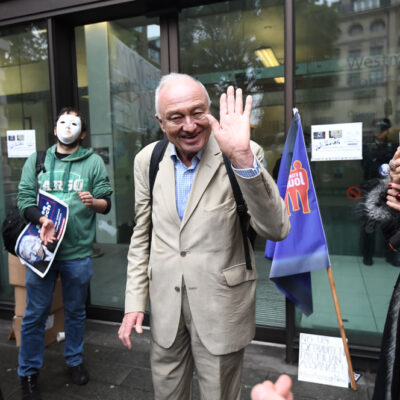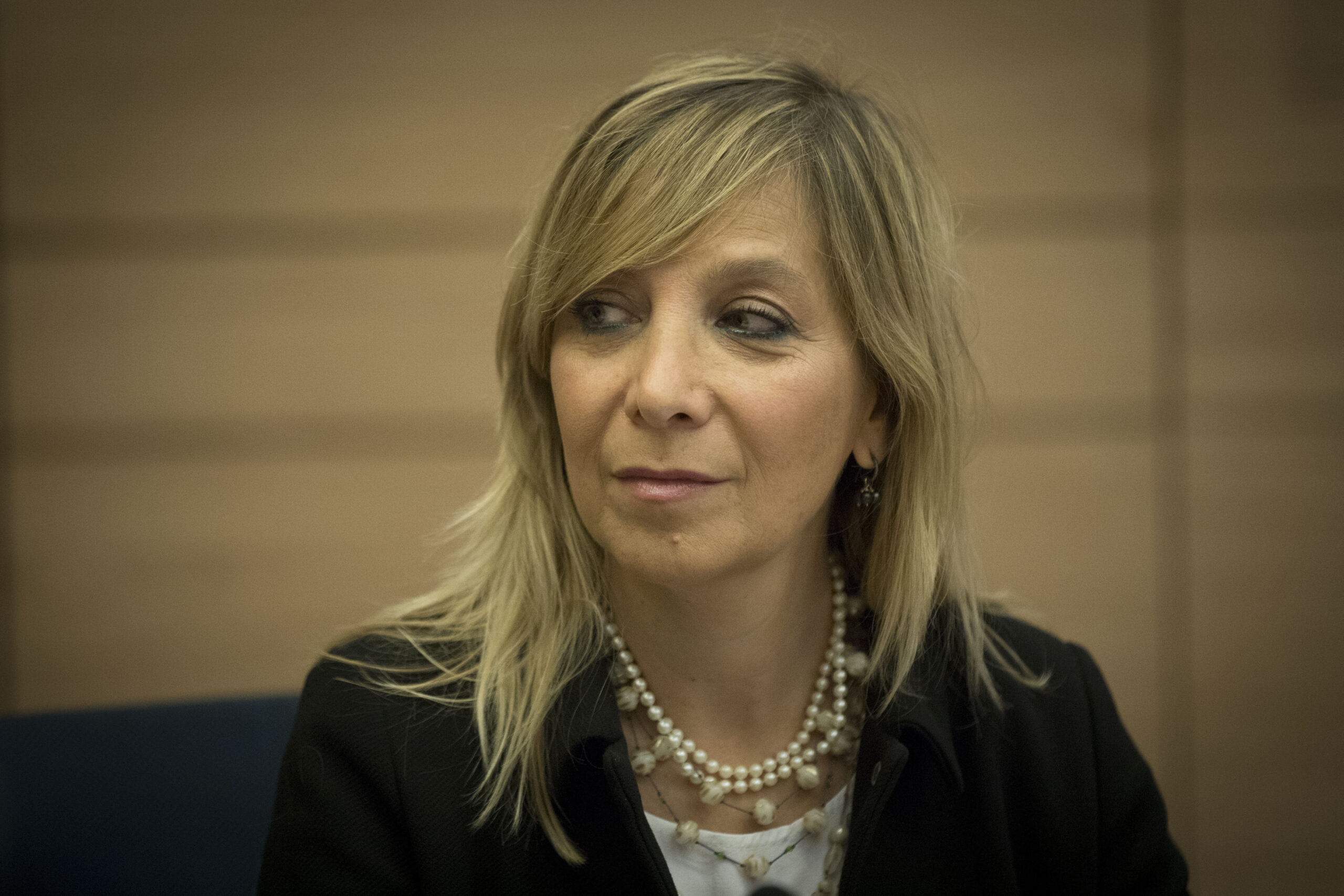Your Daily Phil: JFNA and Israeli gov’t partner on $14M mental health project
Good Tuesday morning.
In today’s edition of Your Daily Phil, we report on a new, Jewish-centered fund supporting abortion access created in response to antisemitism in the reproductive rights advocacy space. We feature an opinion piece by Rabbi Joshua Rabin challenging existing approaches to securing the future of Conservative Judaism. Also in this newsletter: Mortimer Zuckerman, Grant Ottenstein and Debbie Yunker Kail. We’ll start with the Jewish Federations of North America’s role in an initiative to strengthen mental health infrastructure in Israel.
Spurred by the traumatic events of Oct. 7, which exacerbated the preexisting mental health crisis in Israel, the Jewish Federations of North America is partnering with the Israeli Health Ministry to establish 16 community-based mental health centers across the country. The $14 million initiative aims to serve 200,000 Israelis annually, reports Efrat Lachter for eJewishPhilanthropy.
“Oct. 7 caught us, as everyone else, by surprise. We were not prepared for it,” Dr. Gilad Bodenheimer, head of mental health services at the Israeli Health Ministry, told eJP. “Initially, we struggled to find a way to provide mental health services to the large numbers of displaced individuals. The resilience centers were overwhelmed, and traditional hospitals were not equipped to handle the surge in demand. We had to rethink our approach.”
So the Health Ministry assigned hospitals responsibility for specific regions, creating a decentralized model meant to bring services directly to the affected communities. The success of this model during the initial emergency phase inspired the ministry to institutionalize the approach.
“We realized that creating trauma centers within the community, operated by hospital-trained staff, could provide a sustainable solution,” Bodenheimer explained. “These centers will not only offer treatment but also serve as hubs of expertise, training other health-care providers in trauma care.”
“These community-based resources will allow individuals with diverse needs to receive treatment discreetly,” added Rebecca Caspi, director of JFNA’s Israel Office. Avoiding the sense of stigma associated with traditional psychiatric hospitals is important. “We anticipate treating about hundreds of thousands of people, representing a systemic response to the current emergency,” she said.
JFNA is contributing nearly $7 million to cover half of the first year’s costs, while the Ministry of Health will fund the remaining half and future expenses. JFNA’s Israel Emergency Response Committee has allocated $3.45 million to support this program, with the additional funding coming from various local federations, including $2 million from Chicago, $950,000 from Toronto, $500,000 from Houston and $300,000 from Dallas.
“The deeply traumatic nature of the terror attacks necessitates a focused approach on mental health,” Caspi emphasized. “This partnership with the Ministry of Health is a crucial part of our support strategy.”
Read the full report here.
COMMITTED TO THE CAUSE
New abortion fund, a safe space for Jewish advocates, draws antisemitic backlash

When Roe v. Wade was overturned two months into Allison Tombros Korman’s tenure leading the DC Abortion Fund, the longtime reproductive health educator and activist thought things couldn’t get worse in her field. Then Korman watched as people she knew and worked with for years turned on her for supporting the Jewish state after the Oct. 7 attacks. At a time when abortion access is under attack, the simmering antisemitism in her field isn’t just morally wrong but a dangerous distraction from the work abortion funds actually do, Korman told Gabby Deutch for eJewishPhilanthropy’s sister publication Jewish Insider. That’s what led her to start the Red Tent Fund, an abortion fund steeped in Jewish values.
The fund’s mission: Abortion funds provide financial support to women who can’t afford them, an area of need that has grown sharply after the Supreme Court’s 2022 decision. The Red Tent Fund — named after a popular Anita Diamant novel that centered on a biblical “red tent,” where women congregated while menstruating or giving birth — will do much the same work as Korman’s previous employer, but nationally. Neither its donors nor beneficiaries need to be Jewish.
A way to keep giving: American Jews support access to abortion at a higher rate than the overall population. A poll released in May found that 81% of American Jews think abortion should be legal in all or most cases, compared to 64% of American adults overall. “Jewish people have been prime leaders of a huge range of progressive causes, and it’s unacceptable for progressive leaders to completely disregard the antisemitism that is manifesting itself so bitterly in the spaces that they are that they are leaving,” said Guila Franklin Siegel, associate director of the Jewish Community Relations Council of Greater Washington. The JCRC chose to be a founding partner of the Red Tent Fund because “it is providing a way for Jewish women to bring their entire selves to the table [and] not have to swallow who they are, and not give up on advocating for a cause that is so deeply important and so commensurate with Jewish values and Jewish interests.”
Off to a good start: Since the Red Tent Fund’s launch in May, individual donors and an unnamed Jewish family foundation have contributed more than $30,000. Distribution will begin in the next two or three months, said Korman. Despite the hostile response to her new venture from the abortion fund community, she said the clinics and health centers set to receive the money have not raised any qualms about working with an explicitly Jewish organization.
Read the full report here and sign up for Jewish Insider’s Daily Kickoff here.
A DIFFERENT APPROACH
Conservative Judaism must slay its zombies

“If you’re following the news, any recent updates on Conservative Judaism focus on the things that are either being cut or shrinking: programs being shut down, schools closing, congregations that can’t find rabbis, etc. Alongside this shrinkage, people are always constructing some plan to change the trajectory. Truthfully, I’ve lost count of how many steering committees and task forces were formed in the past three decades to ‘solve’ these problems, with little to show for it,” writes Rabbi Joshua Rabin of the Astoria Center of Israel in Queens, N.Y., in an opinion piece for eJewishPhilanthropy.
A pattern emerges: “The problem is cyclical, and my record is no better than anyone else. I’ve worked in some corner of Conservative Judaism’s ecosystem for almost 25 years; and because I’m a nerd, I read almost every plan or thought piece that comes out each time a new effort to fix things takes shape. To the extent that anyone analyzes the systemic issues, it appears that muscle memory takes over and we repeatedly blame the same culprits: organizational infrastructure, underpaid staff, etc. Predictably, this blame also results in no meaningful change.”
Ideas as zombies: “S. Alexander Haslam, Mats Alvesson and Stephen Reicher compare long-standing and long-disproven ideas to zombies, ideas that cannot possibly be true but continue to walk among us because they ‘instantiate what those groups want to believe and make true.’ The ideas are ‘dead’ in that they will never work, but they cannot be killed because of forces that keep them ‘alive.’ Haslam et al. argue that if we want to slay the zombies, we must identify the ‘key axioms’ of zombie leadership and interrogate those axioms. Given the current state of affairs, Conservative Judaism has nothing to lose by giving it a try, and neither do I.”
Worthy Reads
Addressing a Critical Gap: ??Focused government attention, private sector changes and scientific discoveries are all reasons to be hopeful that the unmet health needs of women around the world are closer to being addressed, writes Kevin Ali in Forbes. “Data underlines that improving women’s health creates a multiplier effect. A recent McKinsey report suggests that investments addressing the women’s health gap could potentially boost the global economy by $1 trillion annually by 2040. Listening to and learning from women about their health needs is an important step toward creating a better and healthier everyday life for every woman around the world. I saw this firsthand recently as I traveled across the U.S. and Asia, and connected with customers — among them patients, policymakers, [healthcare personnel] within established medical centers and small community clinics… Partnerships across the healthcare ecosystem are critical to advance progress, as no one entity or sector can change the world alone. The private sector should look at stakeholders from across the ecosystem—such as the public sector, civil society, academia and NGOs—that can help find a solution to the challenges faced. These collaborations can leverage diverse expertise and resources, facilitating the development and implementation of innovative solutions.” [Forbes]
A ‘Network Weaver’: In Resilience, Juan del Rio spotlights ECOLISE: the European Network for Community-Led Initiatives on Climate Change and Sustainability. “Humanity and the planet are facing an unprecedented climate, ecological, social, economic and political crisis…We are in moments of deep transformation, urgency and opportunities, and we need to combine strategies of resistance with strategies of building new alternatives. In that context, community-led movements have a pivotal role in fostering the transition towards more regenerative, resilient and just futures. But how do we connect, support and catalyse the existing diversity of initiatives?… ECOLISE, founded in 2014, emerged from a group of activists as a response to the need for a collaborative platform that could bring together the myriad community-led movements and climate action initiatives scattered across the European landscape. Recognizing the inherent strength within decentralised grassroots efforts, it aims to create a metanetwork to harness this collective power: building an enabling environment, connecting, inspiring and leveraging the potential for social innovation by community-led initiatives (CLIs), ultimately catalysing eco-social change.” [Resilience]
Around the Web
A messaging service providing resources for women and girls in Ukraine at risk of gender-based violence due to war and displacement, FemSMS, will receive continued funding from the Jewish Federations of North America through the international nonprofit Project Kesher…
Citing the school’s failure to address rising antisemitism on campus, Mortimer Zuckerman, billionaire philanthropist and editor-in-chief and publisher of U.S. News & World Report, cut off millions of dollars in funding to Columbia University…
The International Fellowship of Christians and Jews has committed $2 million to a food security emergency fund for Israel that will be managed by HaShomer HaChadash. The funds will be allocated to help manage the volunteer infrastructure, with a focus on the heavily impacted regions along the northern and southern borders…
The NonProfit Times reports that America’s “overlap donors” — individuals who donate to causes associated with opposing sides of the political spectrum — tend to have less income than “single-ideology donors” but give more money…
Forbes profiles the children of billionaire investor and philanthropist Warren Buffet, calling them “the most powerful philanthropists in America”…
The U.S. Supreme Court’s recent decision to overturn the “Chevron doctrine” has implications for donors and the nonprofits they support, writes Jack Salmon for Philanthropy Roundtable…
The Jewish Foundation for the Righteous elected Dr. Steven Field as its new chairman and president…
Washington Jewish Week profiles local philanthropist Grant Ottenstein…
The Jewish News spotlights Debbie Yunker Kail and her work as executive director of Hillel at Arizona State University…
Billing itself as the state’s first-ever kosher cafe and operating as a nonprofit, Brooklyn Café opened in Newington, N.H. …
Pic of the Day

Moishe House led a Germany Close Up trip to Berlin and Hamburg last week for 16 participants, pictured here outside the New Synagogue in Berlin. The group explored Germany through a post-World War II lens, learning about Jewish life in Germany after the Holocaust and how the German government and people combat antisemitism today. Highlights included historical walking tours in both cities, meetings with politicians and rabbis, and Shabbat services and dinner at a local synagogue with other community members.
Birthdays

Los Angeles-based attorney, she is the president emerita of the LA chapter of the Jewish National Fund, Alyse Golden Berkley…
Industrialist, former member of Knesset, winner of the Israel Prize, real estate developer and philanthropist, Ze’ev Stef Wertheimer… One of the three co-founders of Comcast Corporation, he served as its chief financial officer and vice chairman, Julian A. Brodsky… Senior U.S. district court judge for the Southern District of New York, Judge Sidney H. Stein… World-renowned violinist, violist and conductor, Pinchas Zukerman… Co-creator of the first-ever spreadsheet program (VisiCalc), he currently serves as the chief technology officer of Alpha Software, Daniel Singer “Dan” Bricklin… Former high-ranking civilian official in the Pentagon during the Bush ’43 administration, now a senior fellow at the Hudson Institute, Douglas J. Feith… Senior rabbi since 1997 at Temple Beth Avodah in Newton Centre, Mass., Rabbi Keith Stern… Past vice chair of the Board of Trustees of The Jewish Federations of North America, Cynthia D. Shapira… British solicitor, he represented Princess Diana in her divorce and Ambassador Deborah Lipstadt in a libel case, Anthony Julius… Pulitzer Prize-winning playwright and screenwriter, Tony Kushner… U.S. Ambassador to the EU in the Trump administration, Gordon David Sondland… Former airline executive at Northwest and Delta, Andrea Fischer Newman… Former president of Viacom Music and Entertainment Group, Douglas Alan Herzog… Businessman and philanthropist, owner of interests in many Israeli firms including IKEA Israel, Matthew Bronfman… Canadian journalist, he worked for CNN International for 30 years, Jonathan Mann… Former Israeli Minister of Science and Technology, now a venture capitalist, Yizhar Nitzan Shai… Chief of staff of the Jewish United Fund of Metropolitan Chicago, Jim Rosenberg… Chicago-based entrepreneur and philanthropist, Victoria Rivka Zell… Former NFL offensive lineman, he is now the president of Collective Mortgage in Colorado, Ariel Mace Solomon… Israeli former professional tennis player, in 2003 she was ranked 15th in the world, Anna Smashnova… Founder of Pinkitzel, a cupcake cafe, candy boutique and gift store located in four Oklahoma cities, Jonathan Jantz… National political correspondent for The New York Times, Shane Goldmacher… Co-founder of Los Angeles-based Meteorite Social Impact and Health Action Alliance Advisors, Steven Max Levine… White House liaison to the Jewish community in the Bush ’43 administration, now managing partner at Arogeti Endeavors, Scott Raymond Arogeti… Features reporter for Jewish Insider, Matthew Kassel… Founder and managing partner at Vine Ventures, Eric M. Reiner… Lactation consultant, Chantal Low Katz…


 Add EJP on Google
Add EJP on Google






